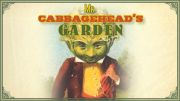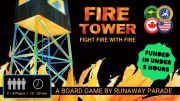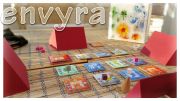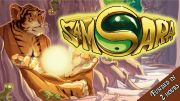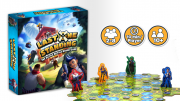Tricky Tides (Andrew J. Smith) – Travel from island to island as you collect and deliver goods as captain of a merchant ship. Each turn, players play a card from their hands. This determines both turn order and also the directions you can travel this turn. When you reach an island you can collect all goods of a matching type or deliver goods to fulfill an order card and earn gold. Each time you fulfill an order you also spot a monster in the ocean. You earn extra points at the end of the game for the monsters you sighted during the game.
Casual Game Crowdfunding: Sea Monsters and Anthropomorphic Vegetables

For fans of tricky decisions and strategic choices, this month Kickstarter offers some unique selections, from Envyra, a simultaneous action strategy game, to the tactical combat of Last One Standing’s battle royale gameplay.
Mr. Cabbagehead's Garden (LudiCreations) – In this charmingly quirky 1-2 player card game full of anthropomorphic vegetables, you are planting your garden in three rows of six cards each. The game takes place over three rounds, each of which has two phases. During the planting phase, you draw three cards from the vegetable deck and plant one card in your garden. The next phase is the neighbor phase. During the neighbor phase, you draw neighbor tokens according to the value of the two vegetable cards you did not plant. The neighbor whose token you drew the most of will come by your garden and interfere with it, moving vegetable cards or removing some entirely. At the end of the game you score more points for groups of matching vegetables and how you arrange them in your garden.
Fire Tower (Runaway Parade) – There's a fire in the forest and all players are trying to protect their own fire tower whilst sending the flames towards their opponents. The game is played on a grid-based board, with each fire tower in one of the four corners. You play cards to add fire tokens onto the grid, spreading out in relation to the rest of the fire. Cards can also be used to quench the fire closer to you and remove fire tokens, or to build fire defenses around your tower.
Goblin Grapple (Silver Gaming Company) – Players compete to gain points by collecting goblins and battling other armies. The first player to one hundred points wins the game. You start with five goblin cards. On your turn you draw a card and then may take as many actions as you want. You can place a goblin in your army. Goblins are placed into your army facedown, on top of all previous goblins played into it. Goblins in your army cannot attack, but they are worth points at the end of the round so long as they are not defeated by other players during the round. You may also attack the top goblin card in a player's army by playing a goblin from your hand. The value of both goblins are compared and the stronger one wins. However, goblins can have special abilities which may change the outcome of a fight. Once you win a battle (whether as attacker or defender), all cards in the fight go into your garrison. Once a player has twenty-one points worth of goblins in their garrison, the round ends. Players total the points in their garrison with the points in their army, and add that number to their total score. If no one has reached one hundred points yet, all cards are then shuffled together and a new round begins.
Envyra (RUDY3 Publishing) – Players compete to capture tiles which are worth a varying number of points. While you can earn a lot of points by capturing tiles that are worth a higher value, you also earn extra points for collecting sets of tiles. Each round has two phases. During the first, players secretly select which two tiles they will attempt to claim. All players reveal their selection at the same time. Different tiles require a different number of cubes to be placed on them in order to be collected. During the second phase, players take turns placing one of their cubes on one of their previously selected tiles. Once each player has placed one cube, they take turns placing their second cube on the second selected tile, but this time going in reverse order, so you have some opportunity to adapt to the choices players make by deciding what order to play your cubes.
Samsara (Oka Luda Publishing) – In this deck-building game, you are attempting to collect five amulets of eternity in order to enter Nirvana. You play one of five characters, each with unique special abilities. The board is divided into eight areas, each of which represents a major life experience ranging from birth to death. Each player starts the game with the same eight cards and draws four more from the deck. On your turn you move around the board, stopping in the area you choose, and draw a card from the deck corresponding to the spot you land on. You may then play cards to take actions, or, if you have cards with symbols matching those on an amulet of eternity, you can play them to take an amulet. However if you use cards with dark symbols on them, bad karma cards will be added to your deck. You also gain bad karma cards if you move to a location occupied by another player and choose not to give him one of your cards. You can also be forced to take bad karma cards if, when you are reincarnated and crossing between the death and birth phrase, you cannot put back two cards from your hand.
Last One Standing (Brendan McCaskell) – Last One Standing brings battle royale to board games. Each player chooses a character with a unique backstory and begins in a random spot on the map. Turn order is determined by how much your equipment weighs. The lighter you travel, the earlier you go. Each round, players take two turns. You may take one of three actions on your turn. These actions are, attacking, moving, or using items. Only at the end of each round can you change out your equipment. The game board is randomized each time you play, and as the game progresses more and more of the board is removed, forcing players into a tighter space. The game can be played either as a free for all, or in teams of two. You can check out our first look at the game here.
Disclosure: unless otherwise noted, we have not seen or played any of the above games. Our assessment of each is based on the information given on the crowdfunding project page.





